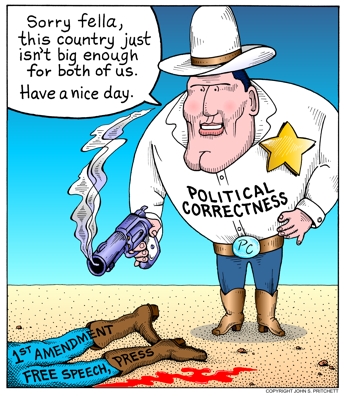We Americans are sensitive creatures. We're a culture that analyzes,
over-analyzes, misinterprets and twists words. An innocent comment becomes a
vicious, racist, elitist, insensitive, bigoted or inarticulate attack in one
swift cycle through the media wringer.
We have an intricate and delicate PC code that, when violated, gets you
1). fired 2). blacklisted or 3). praised. In America,
“rich people” are “people of means,” “illegal immigrants” are “undocumented,” “trailer parks” are “mobile home developments,” “crazed
extremists” are “activists”, and “Easter eggs” are “spring spheres” (that
really happened).
In America,
we’re weird about ethnic terms or nationalities, so we generalize to the point
of ridiculousness. In our attempt to be politically correct, I’d argue we become incorrect, or at least unclear. Instead of referring to Spanish-speaking people by their precise
nationality, we call them all Latinos. Yes, let’s just lump them together
because they’re all the same, right? What's the difference between a Mexican and a Costa Rican anyway? (*sarcasm*)
I don’t mention all of this to sound like I hate being sensitive to discriminatory speech. Rather, my point is this: While we try to find an acceptable way to say
exactly what we don’t mean in English, Spanish-speakers don't beat around the bush so much.
In Spanish, it’s not uncommon to refer to an Asian as a “chino,” to your
somewhat chubby girlfriend as “gorda” (fat), to an obvious foreigner as a
“guiri” or "gringo" and to a man as a “maricón” (a derogatory term
for a homosexual).
It’s dangerous to translate these
words literally into English because the words don’t carry the same weight in
Spanish. It's not that Spanish-speakers are bigots who litter their colloquial speech with epithets, although when thought of in terms of English it may seem that way.
It's just that language is perceived differently. They don't give words so much gravity, and therefore they're not as upset when potentially offensive words are used. Heck, insults in English ("gorda" (fatty), for example) can be terms of endearment in
Spanish (my Spanish roommate tried "gorda" once with his girlfriend, who is my English roommate, and it didn't go over so well).
An anectdotal example of directness in Spanish: A Spanish-language podcast I listen
to is hosted by a couple – the guy is British (but speaks in Spanish), and the
woman is Spanish. On one episode they were discussing how Madrid has changed since Ben moved there
nine years ago. As he describes the evolution, he is tiptoeing around saying
there are more people of different races, especially black, in the city than
when he arrived. Marina, the Spanish wife, tells Ben in Spanish, “Ben, they’re
black. Just like you’re white. It’s OK to say that.”
But perhaps the most convincing anecdotal evidence is this, which admittedly made me cringe a bit:
This is a real page from a Spanish publication (thanks to my friend Sam over at Segun Samantha for showing it to me). It says, "Why don't Chinese people party?" ("hacen botellon" in Spain actually means drinking outside.) It continues, "They don't like to party, they work 12 hours a day, they start businesses with wedding money and they don't want their kids to be like Spaniards because they think we're lazy."
Wow. Sometimes straight-forward Spanish is jarring, like the example above. Sometimes it's comical. Sometimes it's uncomfortable. Sometimes it's mildly disconcerting.
But perhaps we uptight folk should recognize it as at least a little bit refreshing, eh?
Un saludo,
Teresa


